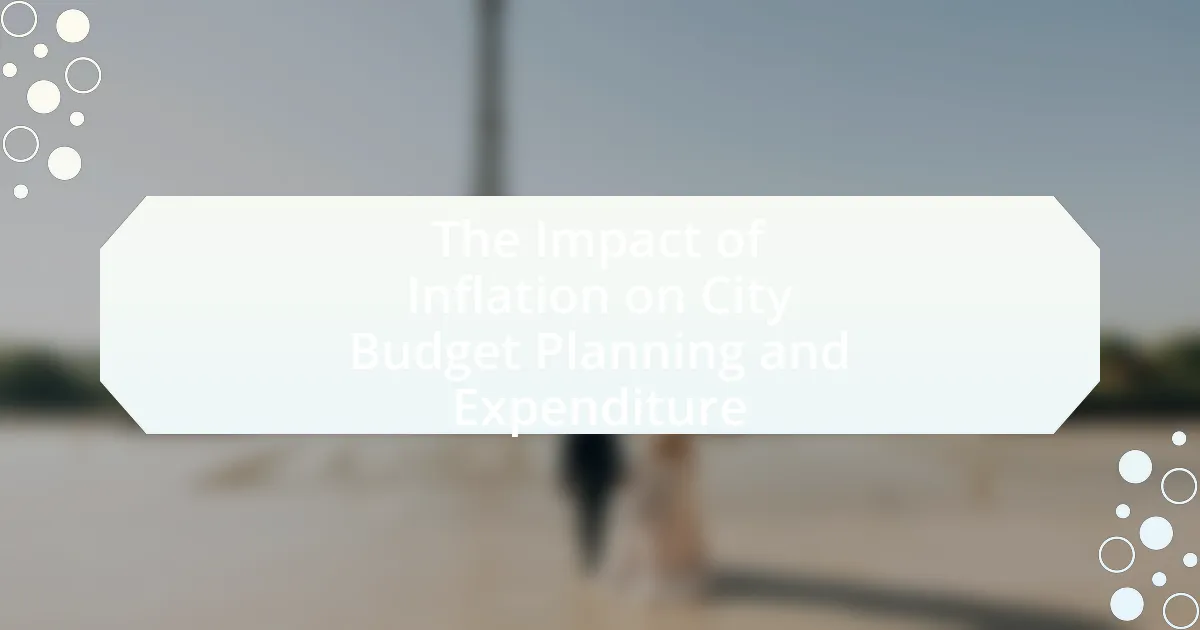The article examines the impact of inflation on city budget planning and expenditure, highlighting how rising costs for goods and services affect municipal financial strategies. It discusses the challenges cities face, including budget shortfalls and the need to prioritize essential services like public safety and infrastructure maintenance. Key factors such as changes in revenue projections and the influence of inflation on public service demands are analyzed. Additionally, the article outlines strategies cities can employ to mitigate inflation effects, the importance of community engagement in budget planning, and best practices for effective financial management during inflationary periods.

What is the Impact of Inflation on City Budget Planning and Expenditure?
Inflation significantly impacts city budget planning and expenditure by increasing the costs of goods and services that municipalities need to purchase. As inflation rises, cities face higher prices for essential items such as construction materials, labor, and operational expenses, which can lead to budget shortfalls if revenue does not keep pace. For instance, a report from the National League of Cities in 2022 indicated that 75% of city officials reported that inflation was affecting their budgets, with many needing to adjust their financial plans to accommodate rising costs. This necessitates either reallocating funds from other areas or increasing taxes to maintain service levels, thereby influencing overall fiscal health and planning strategies.
How does inflation influence city budget planning processes?
Inflation significantly influences city budget planning processes by increasing the costs of goods and services that municipalities need to purchase. As inflation rises, cities face higher expenses for essential services such as public safety, infrastructure maintenance, and employee salaries. For instance, a 2022 report from the U.S. Bureau of Labor Statistics indicated that the Consumer Price Index rose by 7.9% over the year, leading many cities to adjust their budgets to account for these increased costs. Consequently, city planners must prioritize spending, often reallocating funds from other areas or increasing taxes to maintain service levels. This dynamic necessitates a more flexible and responsive budgeting approach to ensure fiscal sustainability amid fluctuating economic conditions.
What are the key factors in city budget planning affected by inflation?
Key factors in city budget planning affected by inflation include rising costs of goods and services, changes in revenue projections, and adjustments in public service demands. Inflation leads to increased prices for materials and labor, which directly impacts the cost of infrastructure projects and public services. For instance, a 2022 report from the U.S. Bureau of Labor Statistics indicated that construction costs rose by 20% due to inflation, necessitating budget adjustments. Additionally, inflation can reduce purchasing power, leading cities to revise revenue forecasts, as property tax revenues may not keep pace with inflationary pressures. Lastly, inflation often results in heightened demand for social services, as residents may require more assistance during economic downturns, further straining city budgets.
How do inflation rates impact revenue projections for cities?
Inflation rates significantly impact revenue projections for cities by altering the purchasing power of tax revenues and affecting economic growth. As inflation rises, the cost of goods and services increases, which can lead to higher operational costs for city services and infrastructure. For instance, if inflation is at 3%, the real value of property tax revenues may decline unless property values increase at a similar or higher rate. Additionally, inflation can influence consumer spending patterns; when prices rise, residents may reduce discretionary spending, leading to lower sales tax revenues. Historical data shows that during periods of high inflation, such as the 1970s in the United States, many cities faced budget shortfalls due to stagnant revenue growth against rising costs. Thus, accurate inflation forecasting is crucial for cities to maintain balanced budgets and ensure adequate funding for public services.
Why is understanding inflation crucial for city expenditure decisions?
Understanding inflation is crucial for city expenditure decisions because it directly affects the purchasing power of budget allocations. When inflation rises, the cost of goods and services increases, meaning that the same amount of funding will buy fewer resources, impacting essential services like public safety, infrastructure, and education. For instance, a 3% inflation rate can erode the real value of a city’s budget, necessitating adjustments in spending priorities to maintain service levels. Accurate inflation forecasting allows city planners to allocate resources effectively, ensuring that budgets reflect the true cost of delivering services to residents.
What specific areas of city expenditure are most affected by inflation?
Public safety, transportation, and public health are specific areas of city expenditure most affected by inflation. Rising costs for materials, labor, and services directly impact these sectors. For instance, police and fire departments face increased expenses for equipment and personnel, while public transportation systems experience higher fuel and maintenance costs. Additionally, public health initiatives often see budget constraints due to inflated prices for medical supplies and services, which can hinder effective community health responses. These trends have been documented in various municipal budget reports, illustrating the tangible effects of inflation on city services.
How does inflation alter the priorities in city spending?
Inflation alters the priorities in city spending by forcing municipalities to allocate more funds to essential services while reducing discretionary expenditures. As inflation increases the cost of goods and services, cities must prioritize spending on critical areas such as public safety, infrastructure maintenance, and healthcare to meet the immediate needs of residents. For instance, a report from the National League of Cities in 2022 indicated that 70% of cities reported increased costs for public services due to inflation, leading to budget reallocations that favored essential services over non-essential projects. This shift in priorities reflects the necessity for cities to adapt to economic pressures while ensuring the well-being of their communities.
What challenges do cities face in budget planning due to inflation?
Cities face significant challenges in budget planning due to inflation, primarily because rising costs of goods and services strain financial resources. As inflation increases, cities encounter higher expenses for essential services such as public safety, transportation, and infrastructure maintenance, which can lead to budget shortfalls. For instance, the U.S. Bureau of Labor Statistics reported that inflation rates reached over 8% in 2022, impacting municipal budgets by increasing operational costs. Additionally, inflation can reduce the purchasing power of tax revenues, making it difficult for cities to maintain service levels without raising taxes or cutting programs. This financial pressure forces city planners to make tough decisions regarding resource allocation and prioritization of projects, often resulting in deferred maintenance and reduced public services.
How do rising costs affect public services and infrastructure projects?
Rising costs significantly hinder public services and infrastructure projects by straining budgets and limiting available resources. As expenses for materials, labor, and operational costs increase, municipalities often face budget shortfalls, leading to project delays or cancellations. For instance, a report from the National League of Cities in 2022 indicated that 70% of cities experienced increased costs for construction projects, which forced them to scale back on planned infrastructure improvements. Consequently, essential services such as transportation, sanitation, and public safety may suffer, impacting overall community well-being and economic growth.
What strategies can cities employ to mitigate the effects of inflation on budgets?
Cities can mitigate the effects of inflation on budgets by implementing cost control measures, diversifying revenue sources, and enhancing efficiency in service delivery. Cost control measures, such as reducing discretionary spending and renegotiating contracts, help manage expenses during inflationary periods. Diversifying revenue sources, including increasing property taxes, implementing sales taxes, or exploring new fees, provides cities with additional funds to offset rising costs. Enhancing efficiency in service delivery through technology and process improvements can reduce operational costs, allowing cities to maintain service levels despite inflation. These strategies are supported by historical data showing that cities that adopt proactive financial management practices are better equipped to handle economic fluctuations.
How can cities adapt their budget planning in response to inflation trends?
Cities can adapt their budget planning in response to inflation trends by implementing flexible budgeting strategies that account for rising costs. This includes regularly updating budget forecasts to reflect current inflation rates, prioritizing essential services, and reallocating resources to areas most affected by inflation. For instance, cities may increase funding for public services like transportation and housing, which are often impacted by inflation, ensuring that they meet the needs of residents despite economic fluctuations. Historical data shows that cities that adjust their budgets in real-time can mitigate the negative impacts of inflation, as seen in the 2008 financial crisis when municipalities that adapted quickly were better able to maintain service levels.
What are the implications of inflation on long-term financial sustainability for cities?
Inflation significantly undermines the long-term financial sustainability of cities by eroding purchasing power and increasing operational costs. As inflation rises, cities face higher expenses for essential services such as public safety, infrastructure maintenance, and waste management, which can lead to budget deficits if revenue does not keep pace. For instance, the U.S. Bureau of Labor Statistics reported that from 2010 to 2020, the cumulative inflation rate was approximately 18%, impacting the cost of goods and services that cities rely on. Consequently, cities may need to increase taxes or cut services to balance budgets, which can further strain their financial health and affect residents’ quality of life.
How can cities forecast inflation impacts on future budgets?
Cities can forecast inflation impacts on future budgets by utilizing economic indicators, historical data, and predictive modeling techniques. Economic indicators such as the Consumer Price Index (CPI) provide insights into inflation trends, while historical budget data allows cities to analyze past inflation impacts on expenditures. Predictive modeling techniques, including regression analysis, can help cities project future costs based on current inflation rates and economic conditions. For instance, a study by the National League of Cities highlights that cities that incorporate inflation forecasts into their budget planning can better allocate resources and manage financial risks, ultimately leading to more sustainable fiscal policies.
What role does community engagement play in budget planning during inflationary periods?
Community engagement plays a crucial role in budget planning during inflationary periods by ensuring that the needs and priorities of residents are accurately reflected in financial decisions. Engaging the community allows local governments to gather valuable insights on how inflation affects citizens, enabling them to prioritize essential services and allocate resources more effectively. For instance, during inflation, community feedback can highlight areas where residents face increased costs, such as housing or transportation, guiding budget adjustments to address these challenges. Studies have shown that municipalities that actively involve their communities in budget discussions tend to achieve higher satisfaction rates and better financial outcomes, as they can adapt to changing economic conditions more responsively.
What best practices can cities adopt for effective budget planning amidst inflation?
Cities can adopt several best practices for effective budget planning amidst inflation, including implementing zero-based budgeting, prioritizing essential services, and utilizing data analytics for forecasting. Zero-based budgeting requires justifying all expenses for each new period, ensuring that funds are allocated based on current needs rather than historical spending patterns. This approach can help cities identify unnecessary expenditures and reallocate resources more effectively during inflationary periods. Prioritizing essential services ensures that critical functions, such as public safety and infrastructure maintenance, receive adequate funding despite rising costs. Additionally, utilizing data analytics allows cities to analyze spending trends and economic indicators, enabling more accurate forecasting and informed decision-making. For instance, cities that have adopted these practices have reported improved financial resilience and better alignment of resources with community needs during economic fluctuations.

Leave a Reply